We've all drooled at the amazing custom set-ups on this site, or even at a Blichmann or Speidel set-up.
But what if you don't have that kind of money, skills or space?
People have been brewing with very little gear with great results.
My setup(1 kettle only):
Basic Gear:
-Brewing kettle, if you want to brew all-grain you will need at least one of these, 9-10 gallons is a good size for a 5.5 gallon brewer, but Ive been making do with 8 gallons by reducing to 5 gallon batches.
-Fermenter, obviously, a good food grade plastic bucket is cheap and has a good advantage, it will hold hot liquid for sparging if you don't have a big enough second kettle.
-Electric tea kettle. Especially if you are limited by one brewing kettle and a normal electric stove, this will help increase your water heating. Both for strike and sparge water it is very useful.
-Good thermometer.
I have 2, an electric roast thermometer for the hot brewing etc., that clips to the kettle and a glass mercury one for checking mash temperature before adding yeast.
-A decent stirring spoon/paddle, long enough to easily reach the bottom of the kettle and fermenter.
-A grain bag, wether you go all-grain or just extract with steeping grains, it's very handy to have a bag.
-An old blanket/sleeping bag/skijacket. For keeping the kettle insulated while mashing.
-A concrete mixing tub to have the fermenter in for cooling down the wort and as a swampcooler during fermentation.
-Ikea sieve for easier draining the brew bag.http://www.ikea.com/ca/en/catalog/products/50103755/
-Starsan or other no-rinse sanitiser, because it's just too cheap to bother with less easy sanitisers.
-A decent electric kitchen scale.
On brew day:
Get all your gear close by, wash everything so it has no debris, but don't sanitise yet. Prepack your hops and other boil additives in plastic freezer boxes by time-to-add
Heat your Strike water, this is the water you will use for the mashing of the grain.
Generally you should heat this water to about 72-74 celcius/162-166 fahrenheit.
This will give you a good mashing temperature when adding the grains.
With a slow stove, the electric water boiler can help out here.
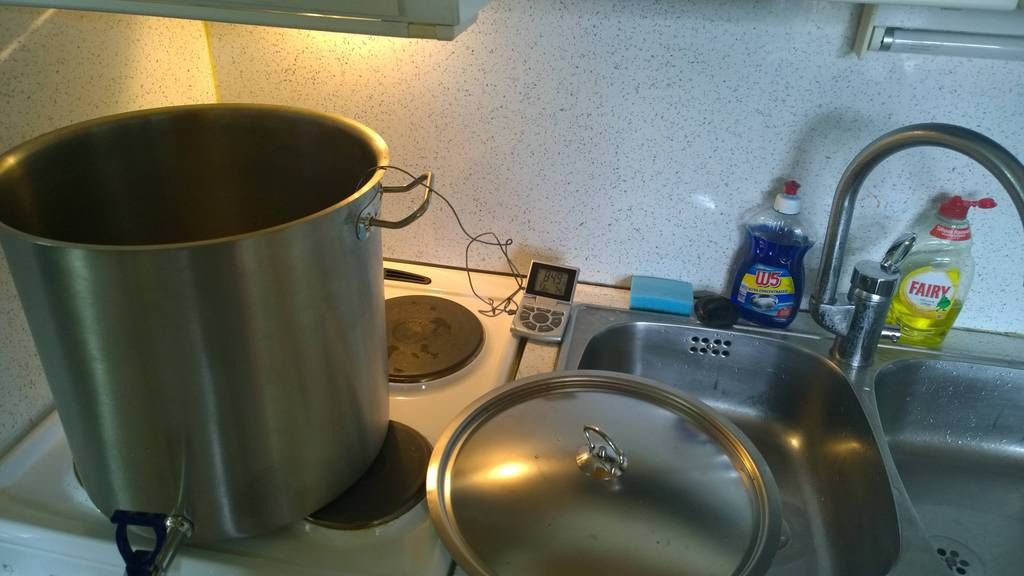
While the water is heating, put your grains in the bag, easiest if you have the bag inside a bucket so it stays up.
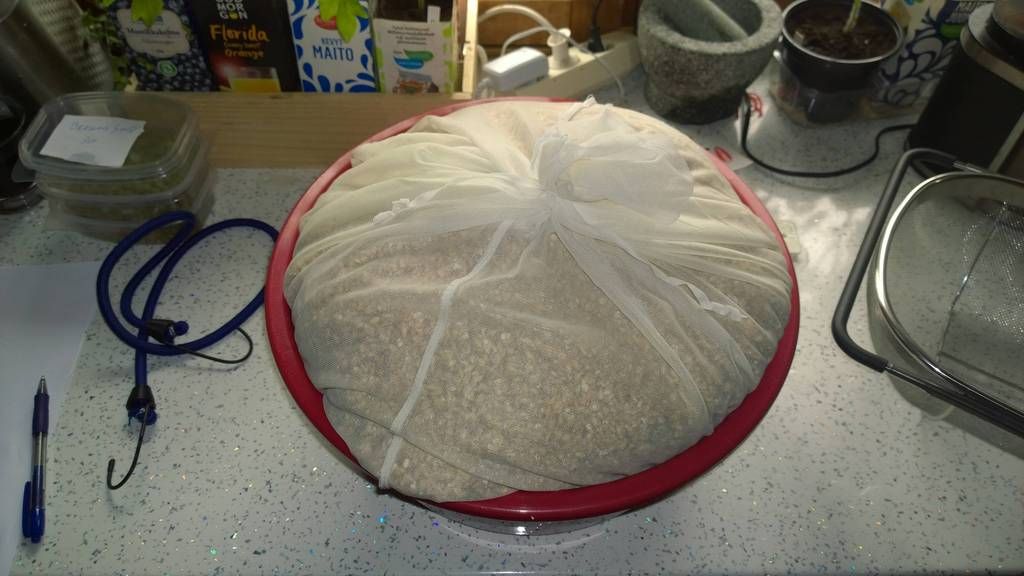
Once your water is hot, add the grain bag to the kettle, I use a basic luggage strap to keep it in place.
Stir the grains so they are all wet and not too clumped.
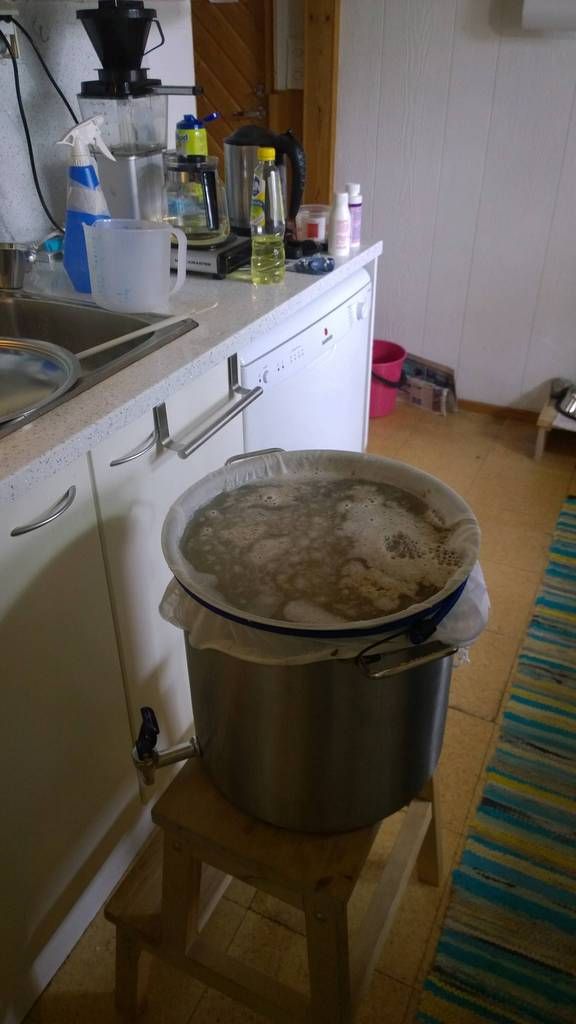
Put the cover on and pack in your blanket or other insulator, leave to mash for 60-90 minutes depending on recipe. You can once every 20-30 minutes stir to try for better efficiency.

Near the end of mashing, heat your sparging water, either in a seperate kettle if you have, or use the electric kettle and your fermenter to store, sparging water should be around 75 Celcius/167 Fahrenheit.
Close and lift the grain bag out of the kettle, rest on the ikea sieve on top of the kettle to drain and sparge.
(still need a picture of this one, next brew i'll make and add one)
Bring the wort to the boil and add your hops according to recipe schedule.
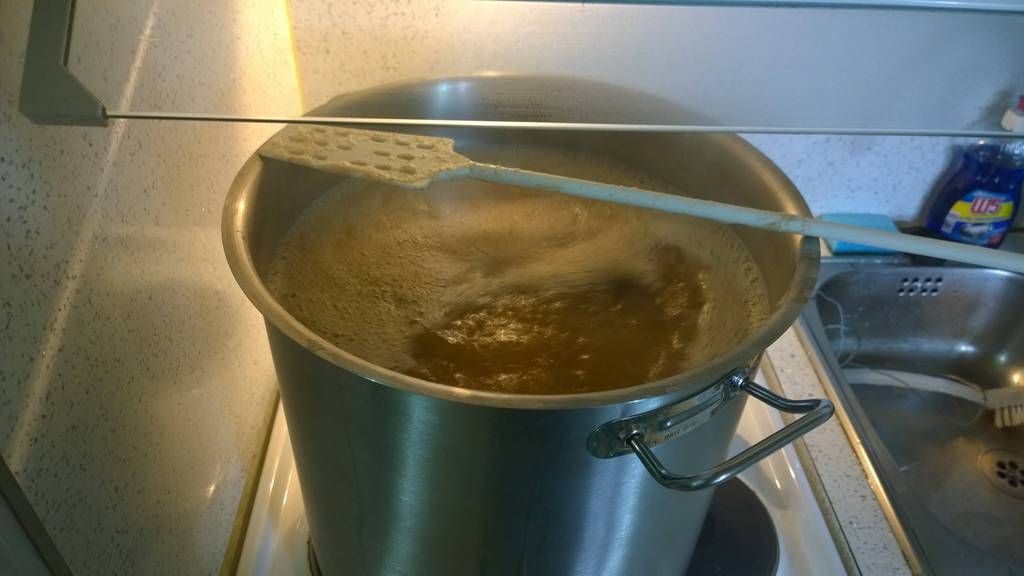
Using a Cleaned and sanitised sieve and emptied grainbag, strain the wort into the fermenter.
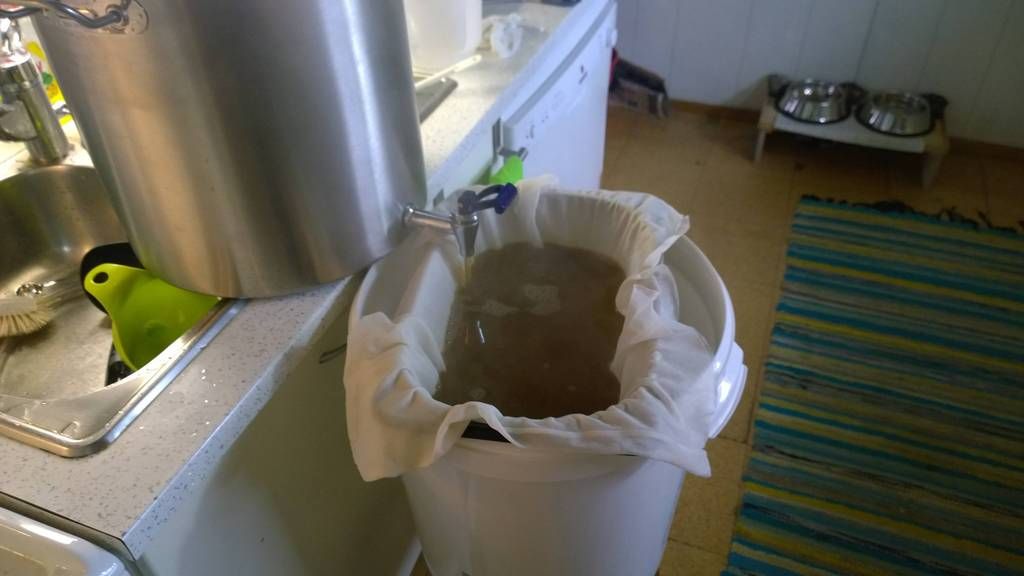
Cool the wort down, either outside in winter, or use the Concrete mixing tub filled with cold water/frozen bottles in summer.
(another picture needed, next brewday)
Rehydrate your yeast if using dry yeast or get your yeast starter.
Open the fermenter, take a gravity sample for your Original gravity, then add the yeast.
Close up and move to your fermentation place, inside the concrete mixing tub/swamp cooler.
(final picture here, later)
But what if you don't have that kind of money, skills or space?
People have been brewing with very little gear with great results.
My setup(1 kettle only):
Basic Gear:
-Brewing kettle, if you want to brew all-grain you will need at least one of these, 9-10 gallons is a good size for a 5.5 gallon brewer, but Ive been making do with 8 gallons by reducing to 5 gallon batches.
-Fermenter, obviously, a good food grade plastic bucket is cheap and has a good advantage, it will hold hot liquid for sparging if you don't have a big enough second kettle.
-Electric tea kettle. Especially if you are limited by one brewing kettle and a normal electric stove, this will help increase your water heating. Both for strike and sparge water it is very useful.
-Good thermometer.
I have 2, an electric roast thermometer for the hot brewing etc., that clips to the kettle and a glass mercury one for checking mash temperature before adding yeast.
-A decent stirring spoon/paddle, long enough to easily reach the bottom of the kettle and fermenter.
-A grain bag, wether you go all-grain or just extract with steeping grains, it's very handy to have a bag.
-An old blanket/sleeping bag/skijacket. For keeping the kettle insulated while mashing.
-A concrete mixing tub to have the fermenter in for cooling down the wort and as a swampcooler during fermentation.
-Ikea sieve for easier draining the brew bag.http://www.ikea.com/ca/en/catalog/products/50103755/
-Starsan or other no-rinse sanitiser, because it's just too cheap to bother with less easy sanitisers.
-A decent electric kitchen scale.
On brew day:
Get all your gear close by, wash everything so it has no debris, but don't sanitise yet. Prepack your hops and other boil additives in plastic freezer boxes by time-to-add
Heat your Strike water, this is the water you will use for the mashing of the grain.
Generally you should heat this water to about 72-74 celcius/162-166 fahrenheit.
This will give you a good mashing temperature when adding the grains.
With a slow stove, the electric water boiler can help out here.
While the water is heating, put your grains in the bag, easiest if you have the bag inside a bucket so it stays up.
Once your water is hot, add the grain bag to the kettle, I use a basic luggage strap to keep it in place.
Stir the grains so they are all wet and not too clumped.
Put the cover on and pack in your blanket or other insulator, leave to mash for 60-90 minutes depending on recipe. You can once every 20-30 minutes stir to try for better efficiency.
Near the end of mashing, heat your sparging water, either in a seperate kettle if you have, or use the electric kettle and your fermenter to store, sparging water should be around 75 Celcius/167 Fahrenheit.
Close and lift the grain bag out of the kettle, rest on the ikea sieve on top of the kettle to drain and sparge.
(still need a picture of this one, next brew i'll make and add one)
Bring the wort to the boil and add your hops according to recipe schedule.
Using a Cleaned and sanitised sieve and emptied grainbag, strain the wort into the fermenter.
Cool the wort down, either outside in winter, or use the Concrete mixing tub filled with cold water/frozen bottles in summer.
(another picture needed, next brewday)
Rehydrate your yeast if using dry yeast or get your yeast starter.
Open the fermenter, take a gravity sample for your Original gravity, then add the yeast.
Close up and move to your fermentation place, inside the concrete mixing tub/swamp cooler.
(final picture here, later)



